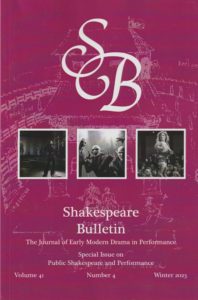When AI goes to theater with humans, it changes the dynamics of the social space. This article examines a case of audiences using an AI app on their phones to translate a sign language performance. Whom does the screen interface serve, and how do artificial intelligence tools affect theatrical publics across both the playing space and the playgoing space? Screens are a site where cultural and performative meanings are generated and negotiated.
Continue readingTag Archives: adaptation
Contemporary Transgender Performance of Shakespeare

Cross-gender roles and performances permeate many of Shakespeare’s plays. Viola presents as pageboy Cesario for most of the dramatic action in Twelfth Night. Falstaff escapes Ford’s house as the Witch of Brainford in The Merry Wives of Windsor. Rosalind ventures into the woods as Ganymede in As You Like It. In that same comedy, Celia (as Aliena), Phoebe, and Audrey were also played by boy actors in Shakespeare’s time. In Cymbeline, British princess Imogen dresses as a male servant, Fidele, on their quest to find their husband among the Roman soldiers. Read the open-access Borrowers and Lenders special issue on contemporary transgender performance of Shakespeare. Continue reading
The Value of Global Shakespeare
Shakespeare and East Asia (2021) explores distinctive themes in post-1950s Asian-themed performances and adaptations of Shakespeare. In this Snapshot, former Fulbright Scholar Alexa Alice Joubin discusses the book and the importance of wider research into Global Shakespeares. Continue reading
Five Things to Know about Global Shakespeare
A daptations of the classics not only creates channels between geographic spaces but also connects different time periods. Performing Shakespeare in different languages opens up new pathways to some often glossed over textual cruxes in Anglophone traditions.
daptations of the classics not only creates channels between geographic spaces but also connects different time periods. Performing Shakespeare in different languages opens up new pathways to some often glossed over textual cruxes in Anglophone traditions.
Take, The Tempest, for example. What exactly do Prospero and Miranda teach Caliban? The word “language” is ambiguous in act 1 scene 2 (Caliban: “You taught me language …”). It is often taken to mean his master’s language (a symbol of oppression). But it can also mean rhetoric and political speech writing, a new tool for him to change the world order. One way to excavate the different layers of meanings within the play and in performances is to compare different stage and film versions from different parts of the world. Caliban’s word, “language,” is translated by Christoph Martin Wieland as redden, or “speech” in German. In Japanese, it is rendered as “human language”, as opposed to languages of the animal or computer language.
Soviet Shakespeares
 In Stalinist Russia, just a few years before the Great Purges, Maxim Gorkii encouraged USSR writers during an All-Union Congress of Soviet Writers in 1934 to emulate Shakespeare as a model of socialist realism. This is only one of the better-known landmarks of Shakespeare’s afterlife in the Soviet cultural sphere. While there were ideologically homogeneous approaches to Shakespeare, there were also debates about the value of Shakespeare after the First World War.
In Stalinist Russia, just a few years before the Great Purges, Maxim Gorkii encouraged USSR writers during an All-Union Congress of Soviet Writers in 1934 to emulate Shakespeare as a model of socialist realism. This is only one of the better-known landmarks of Shakespeare’s afterlife in the Soviet cultural sphere. While there were ideologically homogeneous approaches to Shakespeare, there were also debates about the value of Shakespeare after the First World War.
Due to Karl Marx’s frequent references in his political treatises, Shakespeare held a significant place in a number of communist and other left-authoritarian countries, including China and the USSR. And although there were themes in Shakespeare that turned out to be inconvenient for communist ideology, other Shakespearean plays were put into service. In Part I of this volume of the Yearbook, the special section of chapters explores the vicissitudes of artistic and political uses of Shakespeare in Soviet culture and ideology after the October Revolution in 1917, including in some of the continuing resonances of those uses since the collapse of the Soviet Union. And while the real and perceived resistance to prevailing ideologies of Soviet directors has tended to capture recent critical attention, there is a wide range of Soviet and post-Soviet interpretations of Shakespeare.


